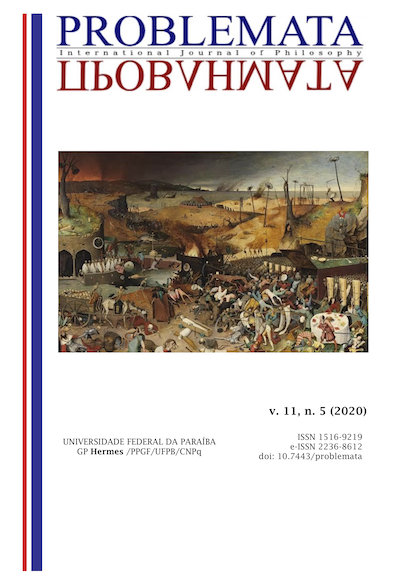CHARLES LARMORE:
THE QUESTION OF REASONABLE DISAGREE
DOI:
https://doi.org/10.7443/problemata.v11i5.52651Keywords:
reasonable disagreement, pluralism, liberalism, intuitionism, contextualismAbstract
The present text deals with Charles Larmore's theory, more precisely, of the relations between the conceptions of reasonable disagreement, pluralism and liberalism. Such a theory has as its characteristics rational intuitionism, contextualism and defends a realistic position of morality.
Downloads
References
Atzori, Claudia, La proposta liberal di Charles Larmore nel dibattito post rawlsiano. Https://www.cosmopolisonline.it/articolo.php?numero=XIII12016&id=9
Fanton, Marcos (2015), O princípio do respeito igual como a melhor resposta às experiências da modernidade: a filosofia política de Charles Larmore. São Paulo: Cadernos de Ética e Filosofia Política. Número 27.
Galston, William A. (1999), Expressive Liberty, Moral Pluralism, Political Pluralism: Three Sources of Liberal Theory. , 40 Wm. & Mary L. Rev. 869, http://scholarship.law.wm.edu/wmlr/vol40/iss3/9.
Larmore, C. (1987), Patterns of Moral Complexity . New York: Cambridge University Press.
Larmore, Charles. (1994), Pluralism and Reasonable Disagreement, New York: Social Philosophy and Policy.
Larmore, C. (1996), Morals of Modernity. New York: Cambridge University Press.
Larmore, C. (1999), The Moral Basis of Political Liberalism, New York: Journal of Philosophy.
Nussbaum, Martha C. (2011), Perfectionist Liberalism and Political Liberalism, Philosophy & Public Affairs 39, no. 1.
Mason, Elinor. (2018), Value Pluralism, The Stanford Encyclopedia of Philosophy. https://plato.stanford.edu/archives/spr2018/entries/value-pluralism/
Young, Shaun. (2012), Illusions of difference? Larmore’s political liberalism. New York: Journal of Philosophy, p. 102
Downloads
Published
Issue
Section
License
Authors who publish with this journal agree to the following terms:
- Authors retain copyright and grant the journal right of first publication with the work simultaneously licensed under a Creative Commons Attribution License that allows others to share the work with an acknowledgement of the work's authorship and initial publication in this journal.
- Authors are able to enter into separate, additional contractual arrangements for the non-exclusive distribution of the journal's published version of the work (e.g., post it to an institutional repository or publish it in a book), with an acknowledgement of its initial publication in this journal.
-
- Authors are permitted and encouraged to post their work online (e.g., in institutional repositories or on their website) prior to and during the submission process, as it can lead to productive exchanges, as well as earlier and greater citation of published work (See The Effect of Open Access).





